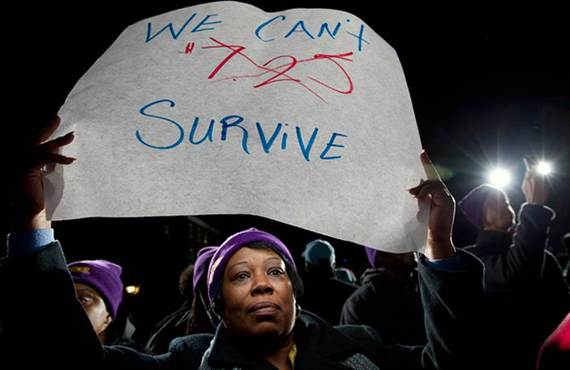Earlier this year, voters in the town of SeaTac, WA, home to the Seattle-Tacoma International Airport, narrowly-approved a ballot measure to increase the local minimum wage to $15.00 per hour.
The measure received national attention not only because of the significant wage level benchmark that it set, but also because of subsequent legal challenges now before the Washington Supreme Court. These court battles underscore an intense and growing divide between worker and more conventional business interests.
Such divisions, along ideology and class, are evidenced also in local governments across America. In San Diego, CA, the Democrat-leaning City Council recently overruled the Republican mayor's veto of a local minimum wage increase to $11.00 per hour.
In Oakland, CA, a coalition of progressive business and civic leaders called Lift Up Oakland is pushing a ballot measure that would establish a city minimum hourly wage of $12.25. Pro-business interests unsuccessfully tried to forestall this effort by preemptive council legislation. The proposed wage floor would represent a significant bump above the current California state minimum, soon to be raised from $9.00 to $10.00 per hour.
These local and state efforts complement President Obama's recent appeal to Congress to increase the federal minimum wage to $10.10 an hour, and his allied initiative to increase the minimum wage level for federal contractors through executive order.
Measure FF is an Oakland ballot initiative this election cycle aimed at indexing the local minimum wage to annual cost of living increases. Philanthropist and social investor Quinn Delaney supports Measure FF and serves as campaign treasurer.
According to Delaney, "We have always applauded success in America and should continue to promote and preserve that tradition. However, we are also a society of fairness and practicality. And there is nothing fair or ultimately intelligent about our expanding class divide in America."
Delaney and her allies are convinced an hourly wage increase in America can better sustain our integrity as a leading beacon of democratic governance. An increase will ensure a broader sharing of national prosperity, ameliorate cost burdens on middle class taxpayers through reduced reliance on government aid by the vulnerable and bolster America's prominence as a thriving world economic power by generating more consumer spending capacity to fuel future growth and quality jobs.
Opponents of wage enhancement measures like those referenced above provide clear and consistent arguments for their position. In their view, a wage increase would badly dampen America's growth prospects. They argue a wage increase would create inflationary pressures, threaten the already shaky viability of many small business owners and impose employer disincentives to hire vulnerable workers, such as increasingly hard-to-employ youth.
But a recent study by U.C. Berkeley researchers shows that inflationary impacts of Measure FF would be negligible for retail, restaurants and the local economy as a whole. Operating costs would increase by a mere 0.3 percent for retail businesses and 2.8 percent for restaurants. Restaurant prices would increase by 2.5 percent, meaning a $10 meal would increase by 25 cents, to a total of $10.25.
Doing nothing to address the growing stresses on wage earners is manifestly not in the larger public interest. Legitimate concerns about resulting business viability and job dampening affects reveal some potential downside to raising workers' wages. However, our nation's political viability is being grossly eroded by the vast disparities we see emerging between the very rich and the rest of us.
According to Pew Research Center, since the mid-to-late 1970s, the bottom 90 percent share less than 50 percent of all of America's pre-tax income. During the same period, the share of pre-tax income among those in the top 10 percent has reached nearly 22.5 percent, the highest level since 1928.
Our nation has been at its best when honoring a longstanding social contract that balances unbounded wealth building opportunity with fairness. Sharing our burdens as well as our benefits across various income groups is what has always made America strong. It is time to renew our commitment as a nation to ensure that all Americans are able to benefit from our expansive national wealth. One first step toward a just future for all is to secure meaningful and immediate increases in worker pay and benefits, such as those being advanced in Seattle, San Diego and Oakland. Efforts like these will strengthen us as individuals and as a nation.
Henry A. J. Ramos is CEO of the Insight Center for Community Economic Development.

